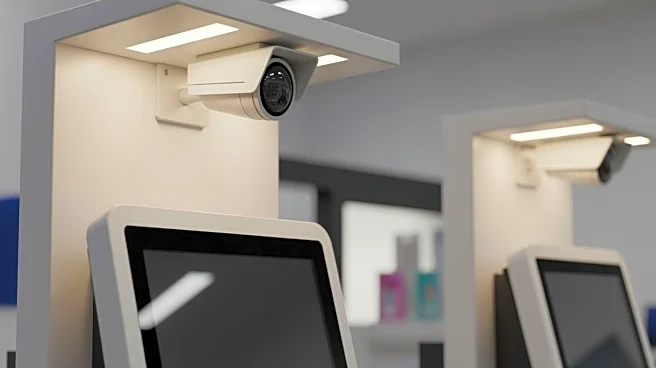What's Happening?
A bill introduced by state Sen. Paul Feeney in Massachusetts aims to regulate self-checkout stations in grocery stores to address safety concerns and rising theft. The bill proposes limiting stores to eight self-checkout stations and requires a minimum
of one manual checkout for every two self-checkout stations. Employees would be restricted to managing no more than two self-checkouts simultaneously. The bill responds to incidents of customer aggression and theft at self-checkout stations, as reported by grocery store workers and union representatives. Supporters argue that the bill will enhance safety and reduce theft, while opponents claim it may increase operational costs.
Why It's Important?
The proposed legislation reflects growing concerns about the impact of automation on workplace safety and retail theft. As self-checkout stations become more prevalent, the reduction in staff can lead to increased vulnerability for workers and higher incidences of theft. The bill highlights the need for balancing technological convenience with employee welfare and security. If passed, it could set a precedent for other states to consider similar regulations, potentially influencing the future of retail operations and labor practices.
What's Next?
The Massachusetts Division of Standards would enforce the bill's restrictions, imposing fines for violations. The bill's progress will be closely watched by stakeholders, including retailers, labor unions, and consumer advocacy groups. If successful, the legislation could prompt other states to evaluate their policies on self-checkout stations and consider similar measures to protect workers and reduce theft. The ongoing debate may also lead to discussions on the broader implications of automation in retail and its impact on employment and consumer experiences.
Beyond the Headlines
The bill raises ethical questions about the role of automation in retail and its effects on labor dynamics. As technology continues to reshape industries, the balance between efficiency and employee rights becomes increasingly important. The potential for increased theft and customer aggression at self-checkout stations highlights the need for comprehensive strategies that address both technological advancements and human factors. Long-term shifts in retail operations may require innovative solutions to ensure safety and security while maintaining customer satisfaction.
















